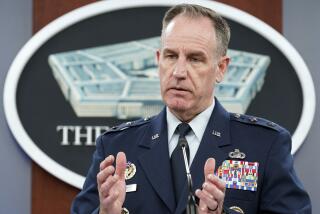Iraq Violating U.N. Export Curbs, Senate Report Says : War aftermath: Baghdad is accused of selling equipment to Iran and using the proceeds for its army.
- Share via
WASHINGTON — Iraq is exporting massive amounts of goods in violation of U.N. sanctions and using the money it earns to buy food, medicine and luxuries for army units crucial to keeping Iraqi President Saddam Hussein in power, Senate investigators reported Wednesday.
A study conducted by the Senate Foreign Relations Committee found commerce moving freely across Iraq’s borders with Iran, Jordan and Turkey. At one time recently, a collection of construction equipment--including 30 bulldozers, seven giant cranes, steam shovels and hundreds of big dump trucks--was seen awaiting export near Haj Omran just a mile from the Iraqi border with Iran.
“From the evidence at Haj Omran, it is clear that Iraq is exporting its infrastructure to Iran at fire-sale prices,” the panel’s 44-page-report says.
The assessment was based largely on a nine-day tour through the Kurdish regions of Iraq by Peter Galbraith, committee staff expert. It provides extensive new details on how porous the economic blockade has become since the Persian Gulf War ended.
The U.N. sanctions bar Iraq from all trade except some imports of food and medicine for its population. During the war, the United States used diplomatic pressure on neighboring allies to crack down on land trade. But it has since resumed openly. The most important U.N. sanction--a prohibition against export of Iraqi oil--has remained effective.
In its report, the Senate committee urges that the United States and its allies take new steps to tighten enforcement and to provide new military and political support for the Kurdish opposition in Iraq. It also recommends that the allied coalition--particularly the United States--formally indict Hussein and his accomplices for war crimes and crimes against humanity--to demonstrate that Iraq cannot regain wide acceptance as long as Hussein remains in power.
Galbraith said he crossed Iraqi lines four times, twice disguised as a member of the minority Kurds, during his visit in early September to get a first-hand look at conditions in the northern regions.
The report says Kurdish insurgents have collected videotapes--apparently taken by the Iraqis themselves--and other evidence to show that Iraqi forces engaged in widespread torture, execution and rape in Kurdish villages.
In releasing the report, panel Chairman Claiborne Pell (D-R.I.) said it shows the United States must adopt a concerted strategy to remove Hussein. “There can be no peace for the Kurds as long as Saddam is in power,” he said.
Administration officials have confirmed that sentiment is growing for tougher U.S. action against the Iraqi leader, but there has been no agreement on methods.
The report by the Foreign Relations staff contains no formal estimates of how much Iraq may be earning as a result of its illegal exports, but Galbraith said current export levels would allow Hussein “to support himself and his repressive apparatus indefinitely.”
Galbraith said it appears from his own investigation that some of the equipment being sold was seized from government enterprises in Kurdistan or was stolen. He quoted Kurdish leaders as saying the Iraqis have exported what amounted to entire factories over the border to Iran to earn money.
More to Read
Sign up for Essential California
The most important California stories and recommendations in your inbox every morning.
You may occasionally receive promotional content from the Los Angeles Times.













